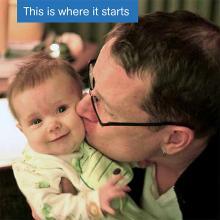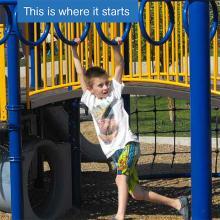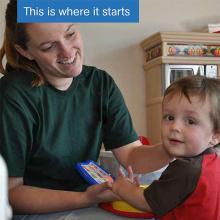This case study is part of This is Where it Starts, a collection of eight case studies on work with children and parents in early years. Case study three.
Background
Castlemilk Family Learning Centre provides care and education to children from birth to five years old (pre-school) and has capacity for 74 full time places. It is open 52 weeks a year.
Funding (and costs where available)
Funding: Mainly Glasgow City Council but applications are made for other grants where necessary.
Size and number of staff
74 full time places available for children, 21 nursery staff, two clerical staff
Referral routes
Self-referrals, statutory and third sector social services according to Glasgow City Council's Admissions Policy
Key partners
Glasgow Life, School Gates and Urban Roots
Established
1999
Key Messages
Be a source of stability for parents
For parents who are isolated and have chaotic lives, the centre aims to provide stability and safety. As the centre manager explained, 'for some parents we're the only people they can talk to...we're always here to listen'. Good relationships with parents means that centre staff can pick up on changes in parents very quickly, intervening early when there's a problem or when risk may be increasing. Similarly, staff can see when a child's behaviour changes, indicating something may be happening at home, and are able to approach parents to offer advice and support.
As with case study two - Corsehill Nursery, the centre staff at Castlemilk set the tone with parents during initial meetings and 'settling in periods' when parents first attend the nursery with their children.
A strong message emerging from this case study was that relationship building is a crucial element of effective working with parents. Although staff are experienced in working with families, it is sometimes necessary to 'bring other people in', for example family support practitioners or organisations like Stepping Stones for Families.1
The centre considers a number of things enable them to nurture relationships with parents:
Open doors matter
Many parents attending the centre experience low self-esteem, low confidence, isolation, deprivation, worklessness, chaotic lives and addictions so centre managers appreciate that for some, 'just walking through the door and saying hello' is a huge step in itself. The honest, trusting relationship they seek to build with parents starts with having an open door. This applies not just to the front door of the centre but also, importantly, the nursery office. Staff believe this sends a clear message about the approachability of staff. Managers are not tied to the office but make a point of being involved in the activities of the playrooms and the family room.
Believe in maximising everyone's capacity
Centre staff demonstrate a nonjudgemental attitude towards the parents they work with and describe a genuine asset-based approach where they believe in maximising the capacity and skills of parents. The centre has supported parents going on to college and has seen them develop aspirations and ambitions for better lives for themselves and their children. Staff can testify to the self-esteem and confidence parents gain through their achievements and importantly, the pride their children feel at their parent's achievements - 'my mum can do that!'.
'Child protection still happens'
Staff recognise that positive relationships with parents have to exist in an environment alongside risk and child protection. Safeguarding the positive relationships with the parents never comes at the expense of safeguarding the welfare of children and staff do have to take child protection measures which some parents don't agree with. Where this has happened, centre staff have reflected that because of the good relationships which have been built with parents, even when parents are upset or angry at actions being taken, they can also appreciate that staff 'are only doing their job'. In one case, the centre managed the contact arrangements between a mother and her young son after he had been removed from her care due to her addiction. Because the mother trusted the centre, she was happier to have contact with her son at the nursery rather than in a social work setting and the centre were equally happy to support her to rebuild the bond with her son who was later returned to her care.
Create opportunities for parents and children to learn together
One of the centre's principal aims is to help create better bonds between parents and children. They involve parents in their children's learning and provide an environment for them to play together within the nursery. Parents pick up tips and ideas for activities to do with their children at home. However, the centre has taken this further and created opportunities for parents and children to have learning experiences together through day trips. For some parents, the excursions organised by the centre are the only trips they take outside their community. Supported by Families in Partnership, a Glasgow City Council project, the centre arranged a series of outings around Glasgow including People's Palace, the Scotland Street Museum, the Burrell Collection, Calderglen Country Park, Kelvingrove Art Gallery and Museum and Summerlee Heritage Park. Another outing to Heads of Ayr Farm Park during the summer break was very popular with parents and children. Again, for some this was the only trip over the summer they would have.
Understand the theory
Managers reflected that having staff with degrees in Childhood Practice was important as it provides a theoretical grounding for the work they do with children and parents. Other staff members working on post-graduate degrees used this as a mechanism to do focused pieces of research and feed findings directly into the centre provision. For example, centre staff felt that they could improve how children experienced transitions between the playrooms at the nursery. As part of a degree programme, one staff member undertook a project on transition and, based on research around attachment, rewrote the centre's policy on transition which was then adopted.
Focus on leadership not management
Centre managers drew an important distinction between management and leadership. They described a 'distributed leadership model' which promotes the empowerment of staff by building on their skills, strengths and contributions in a flat rather than hierarchical structure. The commitment to building on individual practitioners' capacity echoes the asset-based approach taken to working with parents.
'It's not just about what you can do'
A strength of the support the centre provides to parents is through partnership working with other agencies and to be able to signpost parents to other resources outwith the centre's remit. The centre describes itself as 'a community resource' and very much part of a larger network of supports and services. The centre has particularly strong links with Miller Primary School which occupies the next building and is the school many nursery children go to when they are old enough. The partnership between the school and the centre means that parents and their children can benefit from a long-term relationship and continued contact with the centre. Case study two describes a similar long-term relationship spanning support across nursery and school.
Make time for self-evaluation and reflection
Time and opportunities for reflection are built into the work of the centre and the working week of the staff. A meeting takes place every week to give staff an opportunity to discuss any issues with specific children or parents. This helps to ensure that if staff have concerns about a parent or child, this knowledge doesn't lie with just one professional. Responsibility for supporting parents and children is distributed and shared across the staff team. The hope is with increased awareness comes a decreased danger of problems going unnoticed or risk escalating. As the manager explained, there is an ethos of 'it's everyone's job' to support children and parents and this can only be realised through sharing of information and good team communication. The weekly meeting is in addition to a monthly staff meeting. The centre advocates a collective approach to staff training where all the team are trained rather than just one or two individuals to ensure the team are 'singing from the same hymn sheet'. The child care forums which operate across Glasgow City Council also provide a valuable opportunity for staff to reflect on and share their practice with a wider network of other child care providers in the area.
Further information
For more on the impact of the work of the centre and the programme of outings:
- TES (2012) Never too old to learn, 4 May 2012
- Stepping stones for families






